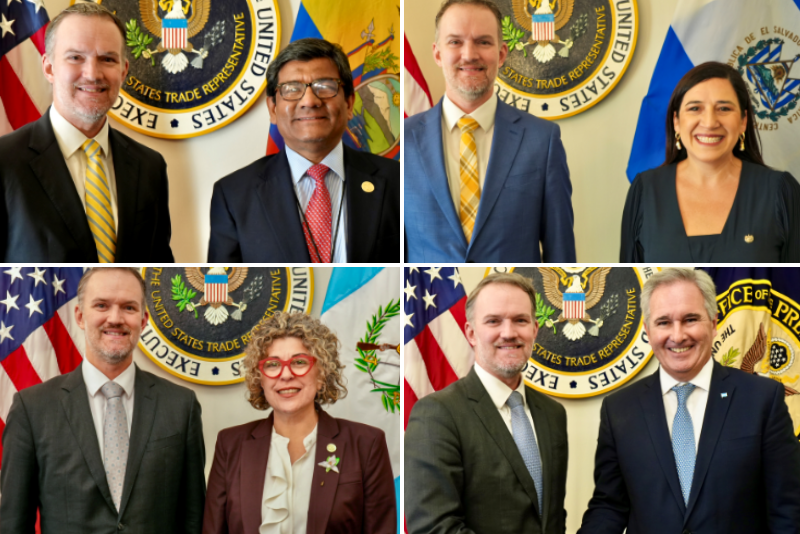🔴 Website 👉 https://u-s-news.com/
Telegram 👉 https://t.me/usnewscom_channel
OAN Staff Brooke Mallory
6:33 PM – Thursday, November 13, 2025
The White House announced four new trade frameworks with Argentina, Guatemala, El Salvador, and Ecuador. The deals, being described as a “historic step” toward reciprocal trade, are meant to reduce longstanding tariffs on U.S. exports while easing import duties on popular Latin goods like coffee, bananas, and beef.
Officials say that they expect the four frameworks to lower prices for American consumers in the coming months.
The Thursday announcements came via a series of joint statements issued by the Office of the United States Trade Representative (USTR).
“President Trump’s leadership is forging a new era of partnership and prosperity across the Western Hemisphere, further advancing the economic and national security interests of the American people. Today’s announcements lay the groundwork for Agreements on Reciprocal Trade to unlock new markets for U.S. exports and lower trade barriers facing American workers and producers. I thank my counterparts from El Salvador, Argentina, Ecuador, and Guatemala for their commitment to achieving fair and balanced trade with the United States,” USTR Ambassador Jamieson Greer said in a statement.
The White House said the new trade frameworks — set to be finalized in the coming weeks — include targeted reductions or removals of U.S. tariffs on select imports from Argentina, Ecuador, Guatemala, and El Salvador.
Advertisement
According to officials, items such as bananas and coffee from Ecuador, as well as certain agricultural and industrial products from the other partner countries, are among those expected to receive tariff relief. Some Argentine beef products have also been identified in early summaries as candidates for lower duties.
The agreements maintain reciprocal baseline tariffs on most goods: a 10% rate for imports from Argentina, Guatemala, and El Salvador, and a 15% rate for those from Ecuador, with specific exemptions for the products covered under the new tariff-relief measures.
The White House described the trade frameworks with Argentina, Ecuador, Guatemala and El Salvador as part of a “fair and reciprocal” trade agenda — addressing longstanding trade imbalances and non-reciprocal arrangements.
| Country | U.S. Export Gains | Import Tariff Reductions | Leader/Partner |
|---|---|---|---|
| Argentina | Reduced barriers on machinery, aircraft | Beef (up to 20% tariff cut) | President Javier Milei |
| Guatemala | Easier access for agricultural tech | Coffee (10% reciprocal tariff) | President Bernardo Arévalo |
| El Salvador | Expanded markets for U.S. textiles | Coffee and produce (10% reciprocal tariff) | President Nayib Bukele |
| Ecuador | Lower duties on energy equipment | Bananas (15% reciprocal tariff) | President Daniel Noboa |
The frameworks build on Trump’s second-term momentum, following similar pacts with Canada and Mexico revisions under the USMCA.
Analysts have also noted the Trump administration’s strategic timing, as holiday shopping seasons approach, with cheaper imports expected to ease household budgets in the U.S.
Critics, however, urged caution. Some Democrats in Congress questioned the lack of environmental and labor safeguards in the initial frameworks, drawing parallels to past Trump-era deals. “While lower coffee prices sound great, we need binding commitments to protect U.S. jobs long-term,” said Sen. Elizabeth Warren (D-MA) in a statement.
Latin American leaders expressed enthusiasm. El Salvador’s President Nayib Bukele, a Trump ally, tweeted support for the “mutually beneficial” pact, while Argentina’s libertarian President Javier Milei celebrated it as a “victory against globalist protectionism.”
As negotiations progress, these deals could eventually reshape U.S.-Latin America trade dynamics, potentially adding billions to bilateral commerce.
Congress does not need to approve the new trade frameworks since they are preliminary. They are non-binding initial agreements focused on targeted tariff adjustments and market access, which the executive branch can negotiate and implement using existing presidential authorities, such as under the Trade Expansion Act of 1962 or International Emergency Economic Powers Act. However, if they evolve into comprehensive, binding free trade agreements (FTAs) requiring changes to U.S. law, congressional approval via implementing legislation would be required.
Stay informed! Receive breaking news alerts directly to your inbox for free. Subscribe here. https://www.oann.com/alerts
What do YOU think? Click here to jump to the comments!
Sponsored Content Below
